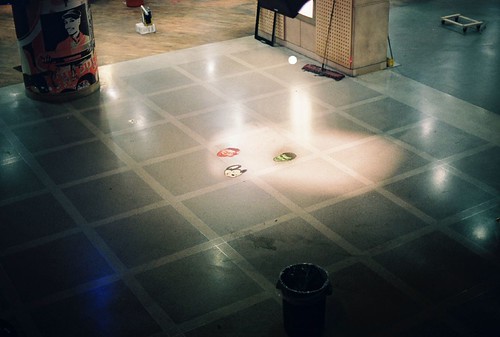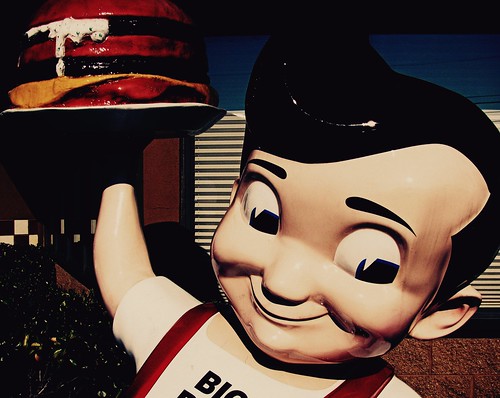As noted: I’ll be speaking Friday night, May 8, as part of an event at New York University called Blowing Up The Brand: Critical Perspectives on Promotional Paradigms. This event is free and open to the public — but apparently because it’s at NYU you must register/RSVP, details here.
I’m working on my talk now, and it will be an attempt to tie together ideas about murketing-think as it relates to personal identity. I don’t meant personal identity in terms of “we are what we buy,” I mean the way the tools of commercial persuasion are being applied to the expression — or depiction — of indie-biz, of individuals, and of self itself. The blurring of the line, you might say, between commercial persuasion and personal identity.
Basically I will try to build on some of the ideas in Buying In: The Secret Dialogue Between What We Buy and Who We Are, as they are being manifested on a more personal level in this Web 2.0/Depression 2.0 moment.
I am thinking the talk will be titled, “If You Follow Me I Will Follow You Back.”
Needless to say, the book will be for sale at the event. So tell your friends, fans, and followers.
More about the conference here.
(I screwed up the dates of this event in the earlier post. What you see here is correct.)
Posted Under:
Flickr Artifacts by Rob Walker on April 14, 2009
Comments Off on Flickr Interlude
 WORK STUDY
WORK STUDY
What is entrepreneurship? One student’s answer: His thriving startup.
This week in Consumed, a look at a college student who built a business before he graduated — not by dreaming up a big idea, per se, but by executing.
It’s not a business plan; it’s a business, with 14 full-time employees and about $950,000 in revenue last year. Grim economy notwithstanding, Coryell says he believes the company will fare even better after he graduates next month.
Rooting for the abstract idea of the entrepreneur, whether a small-business owner or the hypothetical Next Bill Gates, is one of the great clichés of American politics and life. From consumers to politicians to whatever Joe the Plumber is supposed to be, everyone supports entrepreneurs. They’re pivotal figures who will get us out of this recession. Some observers suggest that the downturn is actually sparking entrepreneurship, as laid-off workers make a go of a variety of new small businesses. Funny then that, as Coryell notes, “the thing about entrepreneurship is that nobody knows what it is.”
Read the column in the April 12, 2009, issue of The New York Times Magazine, or here.
Consumed Facebook page — now with wall posting, so comment away — is here.
Consumed archive is here, and FAQ is here. The Times‘ Consumed RSS feed is here.
“Letters should be addressed to Letters to the Editor, Magazine, The New York Times, 620 Eighth Avenue, 6th Floor, New York, N.Y. 10018. The e-mail address is magazine@nytimes.com. All letters should include the writer’s name, address and daytime telephone number. We are unable to acknowledge or return unpublished letters. Letters may be edited for length and clarity.”
Continuing the effort to put Consumed readers in the spotlight, here’s the latest a series of mini-Q&As with some of the interesting people who have joined the Consumed Facebook page.
Today: Rob Horning, author of Marginal Utility on PopMatters.
 What are you working on now, or making public soon, that you’re particularly excited about (and why)?
What are you working on now, or making public soon, that you’re particularly excited about (and why)?
Aside from continuing to post on weekdays at Marginal Utility, I’ve just started to go through and try to tag all the blog posts I’ve written since I started in 2004. My hope is that this process will not only make the blog marginally more useful but will help me consolidate my ideas for a possible book. I’m trying to fight my own tendency to keep pressing forward, keep dashing off more or less spontaneous responses to things to satisfy my inclination to write, and put together something more carefully reasoned than what I generally do in blog posts — probably it will be about that very tendency at some level, the currents in contemporary culture, in consumerism, that work against our slowing down, dwelling with things, encouraging us instead to accumulate experiences and things without the hassle of thinking of them too particularly.
And of course, I’m excited to have discovered Hipster Runoff [rw note: sometimes NSFW] a blog that is well worth blogging about — I hope my efforts at placing the ever-ludic Carles in his proper theoretical context at hroexegesis.blogspot.com are helping lift the veil on his philosophy a bit.
Is there something you would have bought, or used to spend money on, a year ago, that you would not today?
I used to be stuck in a pattern of eating lunch and then buying a cup of coffee at Starbucks or wherever to take back to the office where I work. (The office provides only Flavia, that awful boil-in a-bag crypto-coffee.) But then on a whim I bought a hot pot at a drug store and started making my own coffee at my desk. It’s been a curious source of camaraderie with coworkers in close proximity ever since. Now I’m very conscious of buying coffee — it seems to happen now only when I am on road trips.
What have you bought/spent money on/or otherwise consumed lately that you’re really pleased with?
In a way, I answered that above, but aside from my hot pot, I’m really inordinately pleased with basically everything I buy at Aldi. I feel like I am consuming the essence of frugality itself when I eat, say, their house-brand prunes. I’ve made a strange fetish out of Aldi that I need to get over. I want it to represent the promise of a post-brand future for the retail of staple items, but my own fixation with it imbues its brand with the halo value I would like to see negated. It seems as though all signifiers inescapably become brands, imbued with commercial identity-shaping ramifications; I wish it was possible for me to see a way through to how brands could become simple signifers again.
And on a related note: Name, if you can, one thing that a friend/coworker/acquaintance bought lately that you find surprising or puzzling.
I just went in on a share of a CSA [“community-supported agriculture,” a kind of farm co-op] with a friend. I still don’t think I quite get it; I have no idea what to expect. I have this vision of joylessly and hurriedly eating turnips and dandelion greens to make room in the fridge for the kale shipment.
Thanks for the answers! (And thanks for both of your fine blogs.) Next mini-Q&A might be in one week, with Alan Lugo, if he sends me answers as promised. We’ll see!
Join the Consumed Facebook page here, and if you’re interested in being Q&A’d, just let me know.
Posted Under:
Reader Q&A by Rob Walker on April 10, 2009
Comments Off on Consumed reader Q&A No. 4: Rob Horning
As some of you know, I was interviewed for the documentary Objectified, which has shown in a few cities already, and has some (sold out) screenings in New York starting last night. I’ve seen the movie, and it’s pretty interesting and I think worth seeing if you’re interested in material culture in the 21st century (which I assume you are or why in the world are you on this site)?
Anyway, I thought I would pass along an observation or two about being interviewed. Possibly it’s of interest only if you’ve seen the movie, I don’t know. Please continue…
“The Virgin Megastore in Times Square, two days before it closed.”
I have very belatedly become aware of a critique of my various comments and writing about the downturny zeitgeist. The details aren’t important, but the upshot of the critique is that my resistance to statements like “cheap is the new sexy” or “frugal is the new cool,” somehow adds up to me being in denial about the economy.
I am most certainly not in denial about the economy. I do think some of the trend stories suggesting an overnight change in “values” are extremely suspect. But my real problem is that many of these sweeping statements about the zeitgeist suggest consumer behavior — and thus, by extension, human behavior — is solely a function of larger economic and cultural forces.
I think such assessments give short shrift to free will itself. Let me put it this way:
Is your behavior merely a reflection of cultural change?
Or does your behavior cause cultural change?
I know what I think the right answer ought to be. It’s the answer that motivated me to write Buying In and, more recently, to launch the newest iterations of the Unconsumption project. And it’s the answer that makes me resist the blithe pronouncements of the trend industry. What they have to say may well be useful to their clients (I guess), and that’s totally fine. But it is not, in my view, very useful to the rest of us.
I don’t really even have a problem with the endless musing about whether Americans will continue to be “thrifty” after this downturn ends. I don’t love those stories, but I know they have to be written. However, my point of view is that the mystery of what happens next isn’t, or shouldn’t be, determined by way of reacting to the uncontrollable. It should be determined by individuals making decisions. Exercising free will.
So my view is that ulitmately the answer to those questions I posed above about whether individual decisions reflect or cause cultural change, is … well, that’s up to you, isn’t it?
That question in the headline appeared on the “wall” of the Consumed Facebook page recently.
Here is what I think:
I actually think more people are interested in consumption as a topic than have been at any time since I started writing the column.
Some readers may be interested in a different way than they used to be, but that’s certainly fine with me. The most puzzling misreading of the column has in the past come from those who have seen it as a “shopping column,” as if my goal was to point toward things I think readers should buy.
These days people seem to be more in the general spirit in which the column is actually written: Consumer behavior and consumer culture are topics worth thinking about.
So that’s my take.
But maybe you see it differently. Should I find another way to make a living? If so, will you hire me?
To follow up on yesterday:
What I would like to see happen next in the unconsumption project is the creation of an unconsumption wiki.
I envision it being a better version of this page I created a while ago — where I tried to roll up a lot of information about good ways to (responsibly, satisfyingly) get rid of used-up stuff of all kinds. I liked the idea of creating a resource, but it became really clear really quickly that it was impractical to do it the way I was trying to.
A wiki seems better because it wouldn’t depend on me — anybody could contribute and improve it and add to it at any time. I believe it could be a great source.
I don’t know anything about wiki creation, so my colleague Tom Hosford has looked into it a little bit (exploring options like Mediawiki; Wikia; PBwiki). But I’ll cut to the chase: We could use some help.
1. If you have an opinion about any of the wiki tools just mentioned, or others not mentioned, tell me.
2. Better: If you know (or want to learn) how to build a wiki and you want to get involved in this project, let me know.
Reach me here: murketing@robwalker.net.
Or if you know somebody who want to get involved, pass it along and have them get in touch.
I think this could be a really cool and useful thing, that would have a very positive impact. And I am willing to push, handle, and take responsibility for certain aspects of it — but only if I believe that others are really into it, too, and are willing to truly get involved.
So … I hope to hear from you!
Okay, so, the Unconsumption blog is awesome. I’ve gotten a number of very nice comments about it — thanks.
Although what’s even better than nice comments to me would be spreading the word. Blog/tweet/or actually talk about it, tell your friends and your fans your followers, and like that. Thanks to those who have done so.
The contributing team is: Tom Hosford, college student & Murketing Organization intern, Long Island, NY; Andrew Whitelaw, branding/design strategist, Chicago, IL; Steve Chaney, industrial designer, Portland, OR; Kate Bingaman-Burt, artist and educator, Portland, OR; Amy Shaw, writer and curator, Brooklyn, NY; Rob Walker, journalist, Savannah, GA.
You should check it out.
Now, what’s next? Glad you asked!
I’ll tell you tomorrow.
Todd Wasserman, writing about his Twitter adventures, mentions this:
The dirty little secret of Twitter, though, is that many people get high-follower counts by making it known that they will automatically follow you if you follow them. So when I had trouble getting over the 400 barrier, I Googled “twitterers who automatically follow you” and found a list of 237 people who do just that.
Many of these people, it should be noted, have well in excess of 10,000 followers already, which means that not only will they not be receptive to my messages but, because they are following so many people, they will be unlikely to see my messages.
Fascinating.
And makes me wonder: What is more important — the theoretical audience, or the degree of engagement of members of that audience.
Having 10,000 followers is a powerful “signal” that whatever one is saying is important, even if the reality is that none of those 10,000 are listening.
Having 10 followers who are engaged and useful and paying attention might have more utility. But because your audience “looks” small, the signal to others is that nobody cares what you have to say, so it must not be interesting.
Probably some version of this same basic dynamic holds true for blogs, and articles, and even books, but the visibility of audience-count in the Twitter setup just makes it more obvious.
Anyway, I suppose choosing https://www.capefearcardiology.com/clomid-over-the-counter/ between an emphasis audience size and audience quality (yes, I realize it’s not always a choice), is a matter of individual priorities.
Caption: “Big Boy’s not-so-secret sauce.” B l a c k M a g i c version .
 PANEL DISCUSSION
PANEL DISCUSSION
Buying into solar power — and to the potential appeal of collective buying.
This week in Consumed, a business that rounds of packs of consumers to make group buys of solar power.
Collective buying power has been harnessed in various ways in the past, but generally speaking the strategy has been marginal among contemporary American consumers, maybe because it doesn’t mesh well with the rugged individualist’s self-image.
Then again, in a cultural moment when many individuals aren’t feeling all that rugged, perhaps it makes sense that a company called 1BOG has put collective buying at the center of its business model.
Read the column in the April 5, 2009, issue of The New York Times Magazine, or here.
Consumed archive is here, and FAQ is here. The Times’ Consumed RSS feed is here. Consumed Facebook page — now with wall-posting! — is here.
“Letters should be addressed to Letters to the Editor, Magazine, The New York Times, 620 Eighth Avenue, 6th Floor, New York, N.Y. 10018. The e-mail address is magazine@nytimes.com. All letters should include the writer’s name, address and daytime telephone number. We are unable to acknowledge or return unpublished letters. Letters may be edited for length and clarity.”
Posted Under:
Consumed by Rob Walker on April 4, 2009
Comments Off on In The New York Times Magazine: 1BOG
Continuing the effort to put Consumed readers in the spotlight, here’s the latest a series of mini-Q&As with some of the interesting people who have joined the Consumed Facebook page.
Today: Janet Kim, creator/designer of fashion line Graey.
 1. What are you working on now, or making public soon, that you’re particularly excited about (and why)?
1. What are you working on now, or making public soon, that you’re particularly excited about (and why)?
I recently presented my Fall 2009 collection, where I shifted gears from more casual tees to silk dresses. The presentation was great but in this economy, retailers are cutting buys and don’t want to take chances with a new designer. I just met with Henri Bendel and they are giving me a trunk show in August. This means that I will have to assume the risk in producing the dresses and deciding what gets to be manufactured, but it will be great exposure.
One of the first questions a buyer asks you is where else you’re selling, and as a new designer, it’s kind of a chicken or the egg, catch-22 situation. Buyers don’t want to take a chance on an unknown, but if no one ever takes a chance on you, you’ll never get into a store! The trunk show gets me into Henri Bendel, which is a store that smaller boutiques look to in deciding what new designers to pick up. In addition to the exposure, I’m hopeful that I will sell a good amount of merchandise in the week that they’re giving me, which could lead to other opportunities with the store.
In addition, I am planning a trunk show on May 9 in New York for my private clients. I will pre-sell the dresses at a discount, which will be delivered to the client in about 6 weeks. One of my friends is a jewelry designer (in addition to running an online showroom site) and so I’m going to sell her jewelry in addition to pre-selling my dresses and doing a sample sale of some inventory. It will be more like a party. Hopefully we’ll sell some pieces, but more importantly, it will help me gauge what to cut for the trunk show at Henri Bendel. I am also considering doing an online trunk show, since I have clients that are not based in New York.
2. Is there something you would have bought, or used to spend money on, a year ago, that you would not today?
I definitely have a harder time buying clothes than I used to now that I have my own clothing line. It’s hard for me to find something I like enough to want to buy it because I feel like I should be spending the time/money making my own stuff, unless it’s something that’s ridiculously expensive, in which case I can’t afford it.
3. What have you bought/spent money on/or otherwise consumed lately that you’re really pleased with?
One of my friends is a hairdresser and she gave me a great cut and dyed the underside of my hair. It’s great because it’s subtle but noticeable. She initially dyed it a nice salmon color but it washed out so I redyed it a bright fuchsia color with some Manic Panic dye. The color pops out underneath my black hair.
4. And on a related note: Name, if you can, one thing that a friend/coworker/acquaintance bought lately that you find surprising or puzzling.
When I saw an infomercial for the Snuggie, I kind of wanted one because it looked so comfortable. Then a few weeks later, one of my friends received one as a gift from his coworkers. I was totally enthralled. It’s actually not a great product — it’s made of this really cheap polyester that has bad static cling and picks up every piece of dirt and lint from the ground. But the marketing is so unintentionally comical. We also realized it is actually just a backwards robe! It is great for laughs. The photos on the box are amazing — like the family just hanging out, watching a game in their matching Snuggies.
Thanks for the answers! Next mini-Q&A in one week, with Rob Horning.
Join the Consumed Facebook page here, and if you’re interested in being Q&A’d, just let me know.
Perhaps the now-infamous failed Tropicana redesign was pulled so quickly because people used assorted online media to complain and talk back to the company and so on.
Or perhaps this was more a matter of consumers using a more old-fashioned — and infinitely more potent — form of expressing disapproval: Not buying.
I assumed Tropicana must have had some sales data that affected their decision to scrap the new look. But wow, that data is much worse than I would have guessed: According to Ad Age, sales dropped twenty percent (unit volume) in the weeks after the redesign!
Tropicana reps cryptically suggest to Ad Age there’s no connection between the sales falloff and the design retrenchment. Riiiiiight.
Posted Under:
Backlashing by Rob Walker on April 3, 2009
Comments Off on How consumers disapprove




 "
"

 WORK STUDY
WORK STUDY What are you working on now, or making public soon, that you’re particularly excited about (and why)?
What are you working on now, or making public soon, that you’re particularly excited about (and why)?

 1. What are you working on now, or making public soon, that you’re particularly excited about (and why)?
1. What are you working on now, or making public soon, that you’re particularly excited about (and why)?











 Kim Fellner's book
Kim Fellner's book  A
A